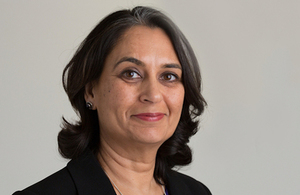Objective
The UK has a long and positive history of migration. Most migrants move through safe, legal routes and can access the significant economic benefits of regular migration. These benefits are also experienced by host countries and countries of origin.
However, irregular migration frequently endangers lives, often the most vulnerable. This is particularly concerning in the context of the COVID-19 pandemic, which we anticipate is likely to drive more migrants towards irregular routes. That is why, under the recently published Integrated Review (p.95) we have committed to taking a whole-of-route approach, working through our diplomatic and development network along key migration routes to address the issues that drive irregular migration in the first place.
In this vein, the UK Government is scoping a pilot project which seeks to address the push factors / drivers of irregular migration in the Kurdistan Region of Iraq (KRI). Through this pilot, we aim to test how economically empowering vulnerable individuals through in-country job creation can contribute to addressing irregular migration flows. We are therefore seeking your proposals for projects to achieve this objective.
The Conflict, Stability and Security Fund (CSSF) is a cross government fund that supports and delivers activity to tackle instability and prevent conflicts that threaten UK interests. It has been a catalyst for a more integrated UK government approach, bringing together the UK’s diplomatic, development, military, and security capabilities to support delivery of the UK Government’s top national security priorities.
Project content requirements
We have a limited evidence base on the drivers of irregular migration in the KRI but our research to date indicates a lack of access to livelihoods / unemployment is a top driver for irregular migration in the KRI:
- recent surveys of Internally Displaced Persons (IDPs) in Iraq found that, of those surveyed, 55% planned to leave, citing under / unemployment as the top reason for this; similarly, employment was the top reason for emigrating (higher than war, education, or family reunification) amongst youths (18-34) in Iraq
- third-sector research indicates that KRI irregular migration is driven by the juxtaposition of high education levels and limited employment opportunities within rural communities
- research indicates that high education levels in rural KRI communities are not translating into economic opportunities, which may compound aspirations for irregular migration. This is particularly pertinent amongst young men and, as such, any livelihood interventions will need to be targeted to the specific needs of the community
In this vein, we are seeking an implementing partner who uses a “Do No Harm” approach, has a proven track record of working with communities in Iraq which are prone to irregular migration, and is live to the associated protection risks. The implementing partner will:
- implement a project which can provide livelihoods opportunities via job creation to address the socio-economic push factors / drivers of irregular migration in the KRI. Any jobs created should be appropriate to the local market and offer meaningful socio-economic integration
- be able to identify and specifically target those who are most at risk of undertaking high-risk irregular migration to the UK – noting that most irregular migrants typically remain within their region of origin – the beneficiary cohort of this pilot project should be limited to a specific demographic
- systematically collect data on the barriers to livelihoods, migrant experiences, and journeys to build a more comprehensive, holistic picture of the key and emerging drivers of irregular migration in Iraq, and those who may undertake it
- include migration-specific Monitoring and Evaluation (M&E) indicators (something which is seldom included in development programmes) to measure the effect of the intervention
Bids for the project should address the following:
- how your organisation is well-equipped with the expertise and resources for this project
- your organisation’s proposed approach to delivering and monitoring the impact of the pilot. Bids should include a particular focus on how they shall measure the value for money impact of their proposed approach. Strong proposals will be high-impact interventions, defined by clear evidence of the potential to deliver solutions that are sustainable and / or scalable
- how your organisation will deliver its activities and outcomes under different COVID-19 scenarios, including full or partial lockdowns and restrictions on local / international travel
- proposals should clearly outline timeframes, costs, risks, and sustainability. Activities should take an inclusive, multi-stakeholder approach, working with local organisations and partners wherever possible
Scope and scale
Funding of £500,000 to £1,000,000 will be available for a piloting phase to 31 March 2023, with potential to scale up the programme in subsequent years.
Bidders should not craft proposals in such a way to reach the budget ceiling. Bidders should instead construct their tender to specifically meet the objectives in pursuit of demonstrable impact and value for money.
The funding available will not be categorised as Official Development Assistance (ODA).
Essential skills and competencies of the implementer
The implementer will have:
- experience working on the relevant issues identified in this document, ideally in conducting research and livelihoods activity concurrently
- relevant network of contacts in the UK and in the proposed geography
- experience and familiarity of migration and socio-economic development programming (particularly in job creation)
- programme, project and budget management skills, experience, capabilities, and capacity
Eligibility criteria
The project will be managed under an Accountable Grant Agreement (or MoU for inter-governmental organisations only). Projects in this framework are not allowed to generate a profit for the delivery partner. Proposals from for-profit organisations can only be considered if an officially registered non-profit making arm or division of the for-profit organisation will deliver the project.
Bidding process
The CSSF Team will evaluate all submissions using the selection criteria listed below. Unfortunately, feedback will only be provided to successful bids, as we expect a large amount of interest.
We estimate that the project approved for funding will start in Q2 (July-September) 2022.
All bid submissions must be in English. The Budget must be presented in pounds (GBP).
Please note, we will not consider proposals that are delivered after the submission deadline.
Selection criteria
Bids will be assessed against the following criteria:
- alignment with the terms of reference
- value for money: economy, efficiency, effectiveness, equity, and cost-effectiveness
- project viability: capacity and capability of implementing organisation(s)
- project design: achievable objectives / outputs / outcomes / impact
Please send queries to charles.laidlaw@fcdo.gov.uk, daniel.ward4@homeoffice.gov.uk or caoimhe.udom@fcdo.gov.uk.

